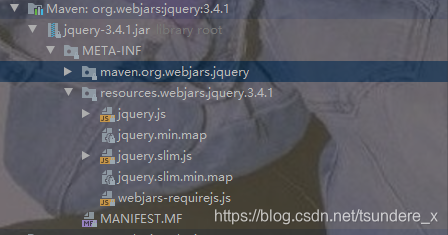SpringBoot笔记整理(三)
SpringBoot笔记整理(一)
SpringBoot笔记整理(二)
SpringBoot笔记整理(三)
SpringBoot笔记整理(四)
Web开发
1、使用SpringBoot:
1)创建SpringBoot应用,选中需要的模块
2)SpringBoot已经默认将这些场景配置好了,只需要在配置文件中指定少量配置就可以运行起来
3)自己编写业务代码
自动配置原理
xxxAutoConfiguration:帮我们给容器中自动配置组件
xxxProperties:配置类来封装配置文件的内容
2、SpringBoot对静态资源的映射规则
@ConfigurationProperties(
prefix = "spring.resources",
ignoreUnknownFields = false
)
public class ResourceProperties {
//可以设置和静态资源有关的参数,缓存时间等
public void addResourceHandlers(ResourceHandlerRegistry registry) {
if (!this.resourceProperties.isAddMappings()) {
logger.debug("Default resource handling disabled");
} else {
Duration cachePeriod = this.resourceProperties.getCache().getPeriod();
CacheControl cacheControl = this.resourceProperties.getCache().getCachecontrol().toHttpCacheControl();
if (!registry.hasMappingForPattern("/webjars/**")) {
this.customizeResourceHandlerRegistration(registry.addResourceHandler(new String[]{"/webjars/**"}).addResourceLocations(new String[]{"classpath:/META-INF/resources/webjars/"}).setCachePeriod(this.getSeconds(cachePeriod)).setCacheControl(cacheControl));
}
String staticPathPattern = this.mvcProperties.getStaticPathPattern();
if (!registry.hasMappingForPattern(staticPathPattern)) {
this.customizeResourceHandlerRegistration(registry.addResourceHandler(new String[]{staticPathPattern}).addResourceLocations(WebMvcAutoConfiguration.getResourceLocations(this.resourceProperties.getStaticLocations())).setCachePeriod(this.getSeconds(cachePeriod)).setCacheControl(cacheControl));
}
}
}
//配置欢迎页映射
@Bean
public WelcomePageHandlerMapping welcomePageHandlerMapping(ApplicationContext applicationContext, FormattingConversionService mvcConversionService, ResourceUrlProvider mvcResourceUrlProvider) {
WelcomePageHandlerMapping welcomePageHandlerMapping = new WelcomePageHandlerMapping(new TemplateAvailabilityProviders(applicationContext), applicationContext, this.getWelcomePage(), this.mvcProperties.getStaticPathPattern());
welcomePageHandlerMapping.setInterceptors(this.getInterceptors(mvcConversionService, mvcResourceUrlProvider));
return welcomePageHandlerMapping;
}
1)所有/webjars/**,都去classpath:/META-INF/resources//webjars/找资源
webjars:以jar包的方式引入静态资源;
https://www.webjars.org/
<dependency>
<groupId>org.webjars</groupId>
<artifactId>jquery</artifactId>
<version>3.4.1</version>
</dependency>

2)“/**”访问当前项目的任何资源(静态资源的文件夹)
"classpath:/META-INF/resources/",
"classpath:/resources/",
"classpath:/static/",
"classpath:/public/"
"/":当前项目的根路径
3)欢迎页:静态资源文件夹下的所有index.html页面,被"/"映射
4)所有的/favicon.ico 都是在静态资源文件下找
3、模板引擎
SpringBoot推荐的Thymeleaf:语法更简单,功能更强大
3.1 引入Thymeleaf
<dependency>
<groupId>org.springframework.boot</groupId>
<artifactId>spring-boot-starter-thymeleaf</artifactId>
</dependency>
3.2 Thymeleaf使用&语法
@ConfigurationProperties(
prefix = "spring.thymeleaf"
)
public class ThymeleafProperties {
private static final Charset DEFAULT_ENCODING;
public static final String DEFAULT_PREFIX = "classpath:/templates/";
public static final String DEFAULT_SUFFIX = ".html";
private boolean checkTemplate = true;
private boolean checkTemplateLocation = true;
private String prefix = "classpath:/templates/";
private String suffix = ".html";
private String mode = "HTML";
//只要把html页面放在classpath:/templates/,thymeleaf就能自动渲染
使用:
3.2.1 导入thymeleaf的名称空间
<html lang="en" xmlns:th="http://www/thymeleaf.org">
3.2.2 使用thymeleaf语法
<!DOCTYPE html>
<html lang="en" xmlns:th="http://www/thymeleaf.org">
<head>
<meta charset="UTF-8">
<title>Title</title>
</head>
<body>
<h1>success</h1>
<!--th:text 将div里面的文本内容设置为-->
<div th:text="${hello}">这里显示欢迎信息</div>
</body>
</html>
1)th:text:改变当前元素里面的文本内容
th:任意html属性,来替换原生属性的值

2)表达式语法
Simple expressions:
Variable Expressions: ${...}
Selection Variable Expressions: *{...}
Message Expressions: #{...}
Link URL Expressions: @{...}
Fragment Expressions: ~{...}
Literals
Text literals: 'one text', 'Another one!',...
Number literals: 0, 34, 3.0, 12.3,...
Boolean literals: true, false
Null literal: null
Literal tokens: one, sometext, main,...
Text operations:
String concatenation: +
Literal substitutions: |The name is ${name}|
Arithmetic operations:
Binary operators: +, -, *, /, %
Minus sign (unary operator): -
Boolean operations:
Binary operators: and, or
Boolean negation (unary operator): !, not
Comparisons and equality:
Comparators: >, <, >=, <= (gt, lt, ge, le)
Equality operators: ==, != (eq, ne)
Conditional operators:If-then: (if) ? (then)
If-then-else: (if) ? (then) : (else)
Default: (value) ?: (defaultvalue)
Special tokens:
No-Operation: _

